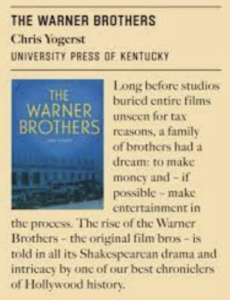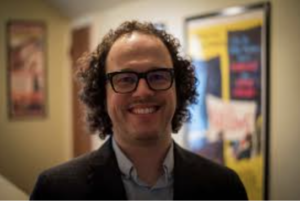John Oakes: The Fast: The History, Science, Philosophy, and Promise of Doing Without
March 2, 2024 by David
Filed under Non-Fiction, WritersCast
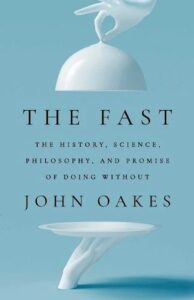 The Fast: The History, Science, Philosophy, and Promise of Doing Without—John Oakes—Avid Reader Press / Simon & Schuster—Hardcover —9781668017418—320 pages—$30—February 13, 2024—ebook versions available at lower prices
The Fast: The History, Science, Philosophy, and Promise of Doing Without—John Oakes—Avid Reader Press / Simon & Schuster—Hardcover —9781668017418—320 pages—$30—February 13, 2024—ebook versions available at lower prices
If you’re expecting to find a “how to guide to fasting” you will have to look elsewhere. John Oakes is far too good a writer and thinker to spend his time writing something simple like a guide book or even a “rah rah” tome aimed at encouraging you to take up the idea of “intermittent fasting” for yourselves. You might decide to try it out after reading The Fast, but that’s not his purpose and not why you should want to read this book. If you are already engaged in fasting, you should read this book. Perhaps it will be most especially useful during the meditative moments while you are in the midst of your own fast.
Oakes is more interested in a deeper approach to this practice, giving it historicity and enabling us to explore for ourselves how denial of a core bodily function can alter consciousness and help us better understand ourselves. This kind of antidote to the habits of modern life does have an appeal to many of us, but even if you are not going to be a practitioner, you will find yourself captivated, as he is, by the science, history, philosophy and spiritual background of fasting and the denial of physical needs. For Oakes, the ideas and the connection to human spirituality are as important as the specific practices themselves. I’m glad of that, as it makes reading this book that much more rewarding to engage with.
I will also note that Oakes, who has been an editor and publisher for many years, is a really terrific writer and therefore you can read this book for the pleasure good writing affords. As I am sure many of you who listen to this podcast have noticed, there are a lot of badly written books out there and no one wants to spend their limited time reading them. Given the vast number of choices of what to read, it is a particular joy to discover a really good writer. Bravo Oakes for spending a lifetime learning how to write, and bravo Avid Reader Press for publishing this book. I hope you will consider reading it yourself after you listen to our conversation here. Whether you decide to fast or not. For myself, much as I like this book, I am happier eating than not, even if it is an indication of my generally shallow approach to spirituality.
I’ve known John Oakes for a number of years through our mutual involvement in independent publishing. He is currently the publisher of The Evergreen Review. He is also editor-at-large for OR Books, which he cofounded in 2009. OR has been a singularly contrarian publisher for many years, built to demonstrate an alternative approach to traditional reliance on a certain popular online bookseller. Oakes has written for a variety of publications and The Fast is his first book.
We had alot of fun talking together about John’s book. Enjoy…
Podcast: Play in new window | Download
Chris Yogerst: The Warner Brothers
February 14, 2024 by David
Filed under Non-Fiction, WritersCast
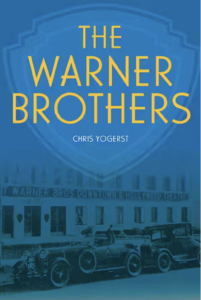 The Warner Brothers by Chris Yogerst, Foreword by Michael Uslan – University Press of Kentucky – Hardcover – 9780813198019 – 360 pages – $34.95 -September 5, 2023. eBook and audio book versions are also available at lower prices.
The Warner Brothers by Chris Yogerst, Foreword by Michael Uslan – University Press of Kentucky – Hardcover – 9780813198019 – 360 pages – $34.95 -September 5, 2023. eBook and audio book versions are also available at lower prices.
My grandfather, Jacob Wilk, worked for Warner Brothers as their east coast representative for almost thirty years, and my father wrote for television and film, as well as books, some of which were about Hollywood. I grew up on stories about “the old days” of Hollywood and my grandfather’s lifelong love of theater and film. He died when I was five years old, so any book that might offer even tidbits about his life and work is always of interest to me. But even beyond my personal connection to WB, stories about the Jewish immigrants who almost all rose from poverty to become the creators of so much of modern American cultural experience are compelling for me to read about.
There have been any number of books written about the rise (and fall) of the Hollywood studios. I think Chris’s book stands out for a number of reasons. Yogerst details the story of the Warner family’s journey from Poland to midwestern America, and then its leap into the emerging movie business, where their success was built not only on risk taking, but the combined talents of its various family members. And Warner consistently took risks both in business and in the content of its films. More than any other film studio or production company, Warner represented the cultural dynamism and more than most the energy driven by the changes of the twentieth century.
The seventy-five year arc of this book documents the complicated Warner family along with its cinematic output and engagement with American culture, politics and world events. Of all the books about the glory years of Hollywood, I think this one might be the best. It was a great pleasure for me to talk to Chris about the book and to listen to what he has to say about the Warner brothers first hand. I hope you enjoy this conversation as much as I did.
Chris Yogerst is also author of Hollywood Hates Hitler! Jew-Baiting, Anti-Nazism, and the Senate Investigation into Warmongering in Motion Pictures and From the Headlines to Hollywood: The Birth and Boom of Warner Bros. He is an associate professor of communication in the Department of Arts and Humanities at the University of Wisconsin–Milwaukee. Find him on Twitter @chrisyogerst as well as Instagram and Facebook @cyogerst.
Podcast: Play in new window | Download
Chris Jones: The Swine Republic: Struggles with the Truth about Agriculture and Water Quality
November 30, 2023 by David
Filed under Non-Fiction, WritersCast
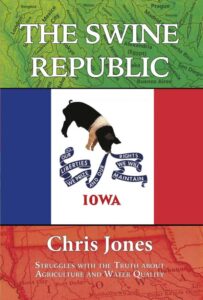 The Swine Republic: Struggles with the Truth about Agriculture and Water Quality – Chris Jones – Foreword by Tom Philpott – Ice Cube Press – 9781948509404 – 400 pages – $29.99 – June 1, 2023
The Swine Republic: Struggles with the Truth about Agriculture and Water Quality – Chris Jones – Foreword by Tom Philpott – Ice Cube Press – 9781948509404 – 400 pages – $29.99 – June 1, 2023
When I saw the title of this book, I knew I would want to read it. How could I resist?
Ice Cube Press is an Iowa-based publisher that consistently publishes books that while often are focused on Iowa stories, readers anywhere should be reading. This book consists of a series of blog pieces written by Chris Jones while he was a Research Engineer with IIHR-Hydroscience & Engineering at the University of Iowa. As a scientist, Jones knows what he is talking about, and because he has been deeply involved in water issues in Iowa, probably understands not only the hydrology but the politics, economics, and sociology of Iowa as well as anyone, maybe better.
I learned so much from this book. It is incredibly informative, and while it is absolutely only about Iowa and its water, environmental and political issues, what Jones talks about applies in so many ways to almost every place in America (and the world). Because there is so much mind-boggling information in this book, as I was reading it, I found myself telling everyone I talked to some of the amazing facts about Iowa that I had never known. And unlike alot of coastal residents, I am have actually spent time in the midwest, and have been to Iowa more than a few times.
Every one of you who reads this introduction and everyone who takes the time to listen to this podcast should buy and read The Swine Republic! If you don’t live in or near Iowa, it is true that alot of the contents of this book will be obscure and relate specifically to people and places you will never know. But beyond the details of water politics, stream pollution and fertilizer run-off in Iowa, and the condition of the drinking water in Iowa, the meta-story (or subtext if you prefer) here is about how modern industry and industrial agriculture have grown too powerful, and how we as citizens must find ways to force ourselves and the structure of our civilization to change – or else, as it seems to me, the changes will be forced upon us in ways that we cannot fully grasp now, but which we can be certain will be more painful when they are upon us.
If you’re like me, when you think of “Iowa,” you immediately visualize farms, rolling hills of corn, and rural life at its most quintessentially American. Of course this is complete nonsense and has been for a very long time, but I doubt that even most Iowans don’t share that image. In reality, Iowa, as Chris Jones describes it, is really a feat of engineering, a vast hydrological construction topped by immense amounts of chemical fertilizer and animal waste that pollutes the groundwater and waterways of the state while agribusiness interests reap equally vast profits and its citizens, landscape and wildlife suffer the consequences.
There are way more pigs in Iowa than people, and as Jones points out, the animal waste produced by Iowa’s pigs, cows, turkeys and chickens is about equal to what a human population of 168 million produces. Unreal. Aside from the incredible data and facts you will learn, you will also gain a much clearer understanding of the intricacies of power and money in modern American agriculture, truly from the ground up. It is not a pretty picture. I really enjoyed reading this book, meeting Chris Jones and talking to him for Writerscast. I am sure we could have gone on for many more hours and I wish we could have done that. Please take a listen.
Chris Jones holds a PhD in Analytical Chemistry from Montana State University and a BA in chemistry and biology from Simpson College. Previous career stops include the Des Moines Water Works and the Iowa Soybean Association. As an avid outdoorsman, he enjoys fishing, bird watching, gardening, and mushroom hunting in both Iowa and Wisconsin. While he spends most of his time in Iowa City, he is especially fond of the Upper Mississippi River and the Driftless Area of Iowa, Minnesota, and Wisconsin. He recently retired from the Univ. of Iowa.
“Truly brilliant—new ways of thinking about stuff that’s right in front of us. I guarantee this will make you see not just the Midwest but the whole world considerably differently.”—Bill McKibben, author, The End of Nature
Podcast: Play in new window | Download
Baron Wormser: The Road Washes Out in Spring
October 7, 2023 by David
Filed under Non-Fiction, WritersCast
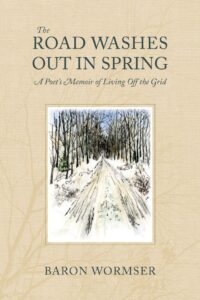 The Road Washes Out in Spring: A Poet’s Memoir of Living Off the Grid – Baron Wormser – Brandeis University Press – 9781684581603 – 214 pages – paperback – $24.95 – March 7, 2023 – ebook versions available at lower prices
The Road Washes Out in Spring: A Poet’s Memoir of Living Off the Grid – Baron Wormser – Brandeis University Press – 9781684581603 – 214 pages – paperback – $24.95 – March 7, 2023 – ebook versions available at lower prices
Baron Wormser is a poet and prose writer whose work I have been familiar with for many years. Back in the 1970s, he and his wife Janet, moved to rural Maine as part of the “back to the land” wave that had been inspired by hippies and the Stewart Brand’s influential Whole Earth Catalog and especially the writings of the now almost mythic Helen and Scott Nearing, vegetarians who pioneered simple living in the 1930s and 40s.
His memoir of that time was originally published almost twenty years ago and now there is a new edition of this meditative, almost poetic narrative of simple living.
Baron and his family lived in a house they built in Maine with no electricity or running water. Much like the Nearings, they raised (and canned) much of their own food, carried water from their well, and read through the long winter nights by the light of kerosene lamps.
As Wormser states early in this book, living off the grid was not meant to be a statement of anything. In fact, as complete novices to the life they set out to live, it turned out that they had built their house in a place that there was no electricity and initially they could not afford to pay to have power lines run to their house. As time went on, they embraced the simplicity of their rural lives and learned from their experienced neighbors, for whom life was not a choice and “lifestyle” would have been a meaningless term.
Wormser refuses any simple understanding or explanation for the lives he and his wife chose for the twenty five year period during which they raised their children and became integral to the local community. He writes about nature and the simple life without sentimentalizing anything, appreciates the good and faces the difficulties head on without failing to note the complexity of everything we prefer to think of as simple. He is a careful thinker and writer, and his poetic self is a presence at all times. Here is a lovely excerpt from the book:
If there is such a thing as a mutable eternity, it is snow falling in the woods. I am thinking of a windless, steady plummeting. Nothing is moving except for snowflakes. You can hear the snow faintly ticking on the pine needle branches. You can hear it descending—a soft sift of air. You are held in the hand of something enormous yet gentle, something extraordinary yet calming, something evanescent yet quite palpable (from a Latin word meaning “to touch gently”). Every surface receives the snow in its way. A large, fallen, curled maple leaf collects the snow in its center. A boulder”s stored heat resists the snow at first. Then its surface turns wet as if it were raining. Then with un-boulder-like delicacy a thin frizz accumulates. On top of the garden gate a fragile white skein begins to perch. Little, almost derby-like hats grow on the garden fence posts. The mown grass around the house fills in gradually. The stiff, frozen blades seem like little heights. Then the snow, as it mounts, receives itself. Another landscape is created and for months we live in that landscape.
When I was in my twenties, I shared the impulse to “head for the country,” where I tried and failed to make a go of living on the land. I greatly admire and appreciate what the commitment that Baron and his family made to live in Maine for a quarter century. And it was a deep pleasure to read this memoir of that time.
In 2000 Baron was appointed Poet Laureate of Maine by Governor Angus King. He currently resides in Montpelier, Vermont, with his wife. In 2009 he joined the Fairfield University MFA program. He works in schools with both students and teachers. Wormser has received the Frederick Bock Prize from Poetry and the Kathryn A. Morton Prize along with fellowships from Bread Loaf, the National Endowment for the Arts and the John Simon Guggenheim Memorial Foundation. In 2000 he was writer in residence at the University of South Dakota. Wormser founded the Frost Place Conference on Poetry and Teaching and also the Frost Place Seminar. His most recent book of poetry is The History Hotel, published by CavanKerry Press.
In other rooms and beyond those rooms
So much was occurring that went on happily
And unhappily, indifferent to protocols,
Brimming with anemones, half-heard melodies,
Averted glances.
(from “Elegy for the Poet Adam Zagajewski”)
Buy The Road Washes Out in Spring
Podcast: Play in new window | Download
S.C. Gwynne: His Majesty’s Airship interview by David Wilk
August 28, 2023 by David
Filed under Non-Fiction, WritersCast
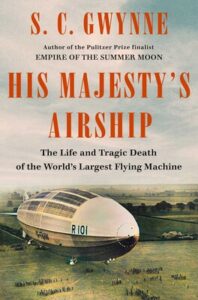 His Majesty’s Airship: The Life and Tragic Death of the World’s Largest Flying Machine — Sam Gwynne — Scribner — 9781982168278 — 320 pages — hardcover — $32.00 – May 2, 2023 — ebook versions available at lower cost
His Majesty’s Airship: The Life and Tragic Death of the World’s Largest Flying Machine — Sam Gwynne — Scribner — 9781982168278 — 320 pages — hardcover — $32.00 – May 2, 2023 — ebook versions available at lower cost
Sam Gwynne is the author of the outstanding Empire of the Summer Moon, a book I really loved. In this new work, he tells the story of a very different sort, documenting the British airship R101, but covering essentially the entire rise and fall of “lighter than air” powered flight. Like so many other airships, R101 crashed horribly in 1930 and killed almost its entire crew, including the leadership of the British airship industry, which at the time still hoped for an empire conquering means of travel. It was a massive case of a foolish, hubristic belief in something that could never succeed. It’s tempting to view this disaster as symptomatic of an empire in decline.
At least for a time, airships were a symbol of the future. R101 was, in fact, the largest aircraft ever to have flown and the product of what appeared to be advanced engineering. Somehow its supporters simply failed to recognize that these massive, hydrogen fueled, uncontrollable flying structures were bound to fail.
There is a captivating cast of characters at hand, including German inventors, well-to-do aristocrats to brilliantly flawed engineers, alcoholic flyers and even a Romanian princess and her doomed romance with the leader of the British airship program.
Gwynne is a masterful storyteller and is able to bring a previously obscure piece of twentieth century history to life for modern readers. It was a pleasure to speak with him about this book, his working methods as a writer of history, and a range of other topics as well. I’m looking forward to reading Sam’s next book, on any subject he cares to write about. He is that good a writer.
S.C. “Sam” Gwynne is the author of acclaimed books on American history: Empire of the Summer Moon and Rebel Yell: The Violence, Passion, and Redemption of Stonewall Jackson, Hymns of the Republic: The Story of the Final Year of the American Civil War, and The Perfect Pass: American Genius and the Reinvention of Football. He grew up in Connecticut, went to Princeton and Johns Hopkins, and now lives in Austin, Texas.
Sam has written for Texas Monthly and for Outside magazine. He was a Correspondent, Bureau Chief, National Correspondent and Senior Editor for Time Magazine and has also written for the New York Times, Harper’s, Los Angeles Times, San Francisco Chronicle, California Magazine, Boston Globe, Dallas Morning News, and other publications.
Buy the book from Bookshop.org
“Aviation history is nothing less than miraculous; it took a mere sixty-three years, after all, to get from the Wright brothers to Neil Armstrong. Barely a century ago, however, our skies were filled with a bounty of gliders, biplanes, and flying boats; balloons, blimps, and zeppelins. With His Majesty’s Airship, the inimitable Mr. Gwynne explores in vivid detail how this dream bloomed, and how it, in time, fell tragically to earth. He has written both a remarkable history and an eye-opening revelation of technology’s recurrent phantasms.” — Craig Nelson, award-winning author of Pearl Harbor and Rocket Men
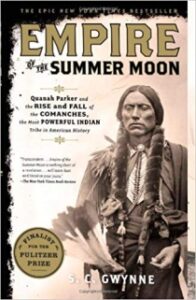
Podcast: Play in new window | Download
Cornelia Maude Spelman: Missing: A Memoir
October 25, 2022 by David
Filed under Non-Fiction, WritersCast
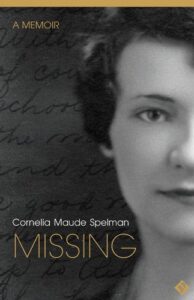 Missing: A Memoir – Cornelia Maude Spelman – Jackleg Press – 9781737513445 – Paperback – 176 pages – $17.00 – July 15, 2022 – ebook versions available at lower prices
Missing: A Memoir – Cornelia Maude Spelman – Jackleg Press – 9781737513445 – Paperback – 176 pages – $17.00 – July 15, 2022 – ebook versions available at lower prices
Cornelia Maude Spelman is best known as a children’s book author. This memoir of her family was spurred by her meeting with and friendship with the late New Yorker editor William Maxwell (himself an extraordinary writer as well), who knew her parents in the 1920s when they were at the University of Illinois together.
Cornelia plainly admired and enjoyed the company of Maxwell, but also was fascinated that he knew her parents before they had children, before their lives went in different directions than Maxwell’s. At one of her meetings with him, she suggests that her parents’ lives were not successful in the terms they had hoped for. Maxwell gently tells her that “in a good novel one doesn’t look for a success story, but for a story that moves one with its human drama and richness of experience.”
It was Maxwell who prompted Cornelia to explore and tell the story of her parents. This memoir tells that story. Spelman spent years exploring the history of her family. It’s a wonderful exploration, full of side trips and thoughtful reflections, and much that anyone interested in the mysteries of their family members will appreciate. Superman was luckier than most of us, in that she was able to meet with people who knew her parents when they were young. Most of us get interested in these stories far too late in our own lives to be able to talk to people who actually knew our older family members, or who, if still around, can remember anything meaningful to tell us.
Spelman’s research is extensive too. She goes to Iowa and Illinois to track down places and information details of her family history and to find people who know something about her parents and their parents. She recounts letters and interviews, even finding medical records and telegrams to help fill out stories that would otherwise be invisible or lost. Importantly Spelman is able to reconstructs her mother’s life and death, as well as that of her long lost brother. Cornelia’s writing is excellent and her storytelling compelling, so that even though we are not connected to the people about whom she writes, we can feel how she feels about them and about herself as she searches out and tells these “missing” family stories.
Cornelia is always honest with us about her disappointments, as well as what she learns that brings her joy and closure as well. This book is warm, profound, and honest. At the end, we know there is still much that will always be missing, but so much more that has been found.
Cornelia Maude Spelman, MSW, was a family therapist before she became a writer and artist. She’s written eleven books for children that help them manage emotions and difficult life situations. Her The Way I Feel series of books for young children has sold several million copies and been translated into Chinese, Korean, Spanish, Greek, Japanese, German, Arabic, Turkish, Danish, and Russian. Cornelia has earned awards from the Illinois Arts Council and was awarded the Bernard De Voto Fellowship in Nonfiction at Bread Loaf Writers’ Conference. This is her first book for adult readers.
It was truly a pleasure to speak with her about this book and her journey to write it.
Podcast: Play in new window | Download
Robert Child: Immortal Valor: The Black Medal of Honor Recipients of World War II
May 26, 2022 by David
Filed under Non-Fiction, WritersCast
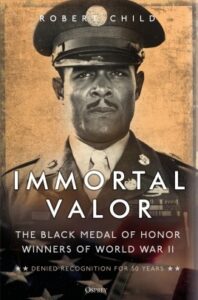 Immortal Valor: The Black Medal of Honor Recipients of World War II – Robert Child – Osprey – 9781472852854 – 288 pages – hardcover – $30 – January 11, 2022 – ebook edition available at lower prices
Immortal Valor: The Black Medal of Honor Recipients of World War II – Robert Child – Osprey – 9781472852854 – 288 pages – hardcover – $30 – January 11, 2022 – ebook edition available at lower prices
It is remarkable to realize how few medals of honor were awarded for service during World War II – there were 432 Congressional medals given out of the over sixteen million men and women who served during that four year period during which America fought large scale brutal wars in both the Pacific and European theaters. It is therefore shocking to find out that not a single African American was among the 432 honorees, despite the fact that over one million African Americans served in the then mostly segregated military environment.
Racism remains an American fact of life. But the “progress” made in the modern era probably has muddied our awareness of what our country was like such a short time ago. Robert Child has done an admirable service with this book, documenting the incredible heroism of the seven Black American heroes of World War II who were finally recognized for their efforts – but only after an incredibly long period of time and much work in their behalf.
Child documents the recent historical investigations that have discovered and the stories of extraordinary acts of heroism and valor by the Black soldiers in World War II who were eventually awarded the highest honor our country offers for wartime service. The group of servicemen includes Vernon Baker, Sergeant Reuben Rivers, and Lieutenant Charles Thomas, who led his platoon that captured a strategically important village in Germany in 1944 despite suffering grievous wounds and losing half the men in his unit. The other four who are portrayed sympathetically and thoroughly in this book are Willy James, Jr., John Fox, Edward A. Carter, Jr., and George Watson, heroes all, not only for their valor in the fights they undertook, but for what they did to overcome the deep-seated endemic racism in the military during the time they served their country.
It was not until 1993 that a US Army commission determined that these seven men had been denied our country’s highest award – only because of racial discrimination. And then it was in 1997, more than 50 years after the war that President Clinton finally awarded the Medal of Honor to them, with only one still being living at the time.
Their stories comprise most of this book, as well as some background about the military before, during and after World War II. Sadly, it is almost certain that there are other Black service men and women who might have deserved recognition for their sacrifices and heroism in that war. It was not even until the Obama administration that two World War I heroes were recognized, Sergeant William Shemin, for whom the anti-semitism of the time meant his amazing feats of heroism were almost lost to history, and Sergeant William Henry Johnson, another Black soldier who had been recognized by France with a Croix de Guerre in 1919, but neglected by the United States for far too long.
It was an honor for me to speak with author Robert Child about this terrific and highly emotional book.
Child is a military history writer, director, and author with. Robert has received writing and directing awards including an Emmy® nomination. He lives in Atlanta.
“This is the only comprehensive narrative written about the African American Medal of Honor recipients of WWII to date. Extremely well written, with very little personal background on some of these men to work with, Child manages to bring each of these heroes’ stories to life on a personal level. Child carefully reconstructs each recipient’s life prior to his act of valor, demonstrating the character traits that made each an example of integrity, sacrifice and courage. This is a must-read book about seven black soldiers and their bravery at the highest level and the racial injustice that took over four decades to acknowledge. Well done!” ―Arthur Collins, President, 5th Platoon, the black World War II education and reenactment group
Podcast: Play in new window | Download
Sarah Vogel: The Farmer’s Lawyer: The North Dakota Nine and the Fight to Save the Family Farm
April 14, 2022 by David
Filed under Non-Fiction, WritersCast
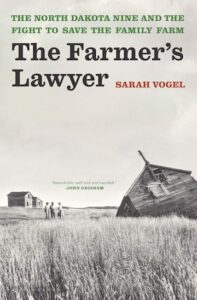 The Farmer’s Lawyer: The North Dakota Nine and the Fight to Save the Family Farm – Sarah Vogel – Bloomsbury – 9781635575262 – 432 pages – hardcover – $28 – ebook edition available at lower prices – November 2, 2021
The Farmer’s Lawyer: The North Dakota Nine and the Fight to Save the Family Farm – Sarah Vogel – Bloomsbury – 9781635575262 – 432 pages – hardcover – $28 – ebook edition available at lower prices – November 2, 2021
Many Americans think of North Dakota and the other prairie states as being conservative culturally and equally unprogressive politically. But that view of these predominantly farming states neglects their long histories of progressive populism that goes back over 100 years. That’s true of North Dakota where the Nonpartisan League was active and strong from the 1920s onward (and into the present, where it still exists as the Democratic NPL — much like the Democratic Farm Labor party in Minnesota that Hubert Humphrey represented.
That history provides the backdrop for Sarah Vogel’s true story in The Farmer’s Lawyer, which tells of a seemingly impossible-to-win legal battle, ironically against the US government agency that was established during the Depression to help family farmers, which by the 1970s was helping to destroy them. At the outset of the Reagan administration (Reagan was helped to be elected, ironically, by the support of midwestern farmers), family farmers of all sizes all across the country were experiencing the worst economic crisis since the Great Depression. Land prices, the backbone of farm economics, had gone down, while farm operating costs were up. and interest rates had skyrocketed. At the same time, in many areas, bad weather severely affected crop output.
Because of policies implemented by the Reagan administration, and growing bureaucracy in the Farmers Home Loan administration, many family farmers were being threatened with foreclosure.
At that time, Sarah Vogel, the daughter of a well known Nonpartisan League supporter and lawyer, was herself a young lawyer and single mother was in the process of leaving Washington, D.C., where she had been working for a government agency. Contacted by some desperate farmers from North Dakota who were on the verge of losing their farms, and inspired by her belief in the importance of family farms to American life, she agreed to represent these struggling clients who couldn’t afford to pay her.
In the midst of her own personal issues, but supported by her family and friends, Vogel brought a national class action lawsuit against the FHLA, which meant she would have to fight against the full force of the Reagan administration’s Department of Justice, in behalf of these family farmers’ Constitutional rights. As a young lawyer who had never privately practiced before, this was her first case!
This book tells the entire years-long saga in incredible detail, brought to life by Sarah Vogel’s writing skill and storytelling prowess. It’s difficult to imagine a true-to-life legal story that has nothing to do with murder or mayhem being a page-turner, but this book will keep you fully engaged throughout. And it will remind you of how difficult it is for “the little guys” to fight against entrenched bureaucracies, especially the Federal government. It is a heroic story for sure, and credits not only Sarah, but her father, and all the farmers she worked with, who would simply never quit, and whose stolidity made such a huge difference, not only to the outcome of their own case, but for many others that followed them.
This is a story about courage, justice, commitment, and belief in oneself. And it is important for us to be reminded that Americans can stand together for the good of all, especially now, when we can agree on virtually nothing. It is an inspiring journey I appreciated learning about. This is a terrific book, and I think we had a terrific conversation as well.
Sarah Vogel is an attorney and former politician whose career has focused on family farmers and ranchers. Vogel was the first woman in U.S. history to be elected as a state commissioner of agriculture. In 2006, the American Agricultural Law Association awarded her its Distinguished Service Award for contributions to the field of agriculture law, and Willie Nelson honored her at Farm Aid’s thirtieth anniversary in 2015 for her service to farmers. She is an advocate for Native American rights and lives in Bismarck, North Dakota.
“Sarah’s story, told in her unique voice, inspires me–and I’m sure it will inspire you–to fight for family farmers.” –Willie Nelson
Author website here.
Buy the book here.

Podcast: Play in new window | Download
William J. Peters: At Heaven’s Door-What Shared Journeys to the AfterLife Teach about Dying Well and Living Better
January 25, 2022 by David
Filed under Non-Fiction, WritersCast
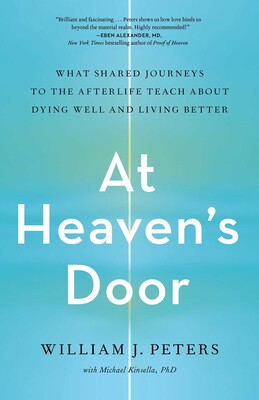 At Heaven’s Door – What Shared Journeys to the Afterlife Teach about Dying Well and Living Better – William J. Peters – with Michael Kinsella – Simon and Schuster – 978-1-9821-5042-6 – Hardcover – 248 pages – $26.00 – January 18, 2022 – ebook editions available at lower prices
At Heaven’s Door – What Shared Journeys to the Afterlife Teach about Dying Well and Living Better – William J. Peters – with Michael Kinsella – Simon and Schuster – 978-1-9821-5042-6 – Hardcover – 248 pages – $26.00 – January 18, 2022 – ebook editions available at lower prices
William Peters is a therapist who had worked for many years with people at the end of their lives. In 2000, when he was volunteering at the Zen Hospice Project in San Francisco , he experienced something very similar to what mystics describe and what some people who have been close to death have reported, the sense of floating in midair, completely out of the body. In this case, he was with his patient in this “other dimension” and the dying person looked at him and smiled. Peters himself returned to his body, but the patient remained unconscious and soon died.
This powerful experience set Peters off on what has become the journey of his life’s work. He began searching for other people who had had similar experiences. He spent more than twenty years finding people, talking to them, and meticulously categorizing their stories to identify the patterns and characteristics of what he calls the “shared crossing” experience. What is really interesting is how similar all these experiences are, regardless of age, gender, background, cultural origin, etc. Many of these stories are included in this book, as people have had visual and sensory effects that are to them evidence of another dimension, that brought with them powerful emotional after-effects that in most cases stayed with them and completely changed their understanding of reality.
Apparently this kind of experience is known to many in the hospice community and even some otherwise rationalist medical practitioners. The book is filled with stories of all kinds, some are spouses and parents of loved ones lost either suddenly or after long illnesses, and some stories are told by individuals who were simply present at someone’s final passage and were chosen to share the experience, or in some cases to help usher the dying person into the light of this “afterlife” dimension.
After years of research and documentation, Peters has a lot to say about what all of these experiences might mean for us – the living. Regardless of our outlooks and beliefs, we all want to know what will happen to us when we die, and those who have shared in the death experience as reported here might allay our all too reasonable fear and help explain what comes next. Our culture does not embrace the experience of death as many other cultures have done – our medicine tries desperately to stave off death, and we are all so attached to living, with no training or understanding of death, we push it away completely.
It does not matter whether you embrace or reject the stories told here, or the literal descriptions of the “afterlife” and the other dimensions the dying experience. Maybe what we experience at death is just a biological projection, after all. Whatever you may choose to believe, knowing more about death, understanding the end-of-life passage, and better integrating it into our lives is important for our psyches.
William Peters is the founder of the Shared Crossing Project and director of its Research Initiative. He has spent many years studying end-of-life experiences. Peters worked as a hospice volunteer with the Zen Hospice Project in San Francisco and as a teacher and social worker in Central and South America. A practicing grief and bereavement therapist, he holds degrees from Harvard’s Graduate School of Education and UC Berkeley.
I had a terrific conversation with William Peters. The book, and my conversation with the author have stayed with me and I continue to explore where it has taken me. It appears to be a simple book, but comes with many layers of understanding and thoughtfulness for the attentive reader.
Visit the Shared Crossing website here.
Podcast: Play in new window | Download
Enrique Salmón: Iwígara: American Indian Ethnobotanical Traditions and Science
January 9, 2022 by David
Filed under Non-Fiction, WritersCast
 Iwígara: American Indian Ethnobotanical Traditions and Science, The Kinship of Plants and People — Enrique Salmón –Timber Press — 978-1-60469-880-0 — Hardcover – $34.95 – ebook and audio book versions available at lower prices
Iwígara: American Indian Ethnobotanical Traditions and Science, The Kinship of Plants and People — Enrique Salmón –Timber Press — 978-1-60469-880-0 — Hardcover – $34.95 – ebook and audio book versions available at lower prices
This is a truly incredible and hugely inspiring book for me. Enrique Salmón, a member of the Raramuri tribe from Mexico, has spent a lifetime learning and studying the medicinal and cultural properties of North American plants. He now teaches at California State University-East Bay in Hayward, California. His work may place him in academia, but he is fully engaged in the natural world.
Salmon begins his work with the deeply held knowledge that all life-forms are interconnected and share the same breath, which is called Iwígara in the Raramuri tribe.
In this book, Salmón presents us with eighty of the most important plants used by North American indigenous peoples. Of course, plants have always been used as food and medicine by indigenous peoples. What is important knowledge for those who are interested in engaging with a plant centric life are the passed down information about identification and harvest, the nature and applications of plants for food and medicine, and to understand how they have been central to traditional stories and myths for the disparate cultures across this continent.
Salmón honors the traditions and practices of so many different tribes here, and helps us understand the variation across different biomes and cultures of the people who live in them. Some of us learn deeply in a specific place across long periods of time, while others may trade breadth for depth. Native peoples are among the former, but most modern people fall into the latter category. A book like this one helps bridge the two different approaches to knowledge. Salmón recognizes that tension, and manages it well here. He understands that one cannot live in deep connection to the natural world without choosing a place in which to live. But readers need to know where to begin, and this book can be an introduction for anyone who wants to begin their own journey of learning and knowledge about plants, healing and cultural traditions.
I should mention also that the book is beautifully designed and includes many excellent photographs and illustrations, most in color. It is excellent work, combining narrative with references suited to beginners and experienced naturalists alike.
Enrique is also the author of Eating the Landscape: American Indian Stories of Food, Identity, and Resilience (2012).
I was honored to have the opportunity to speak with Enrique Salmón for Writerscast about his work, and hope you will enjoy listening to a truly knowledgeable plant practitioner.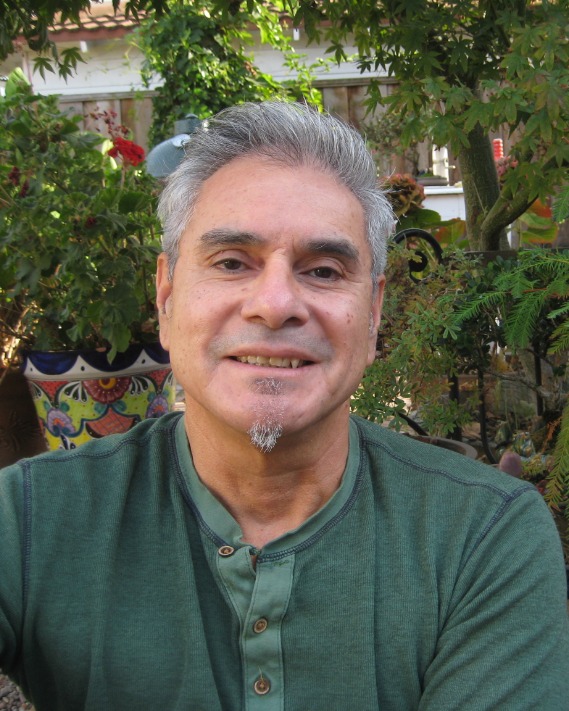
Purchase Iwígara from Bookshop.org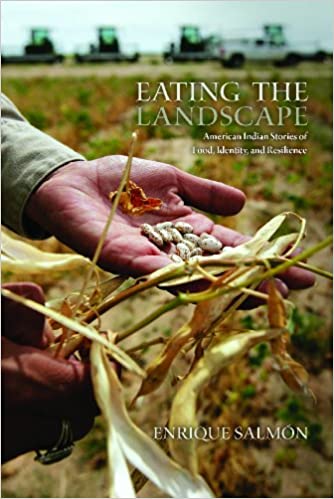
Podcast: Play in new window | Download


